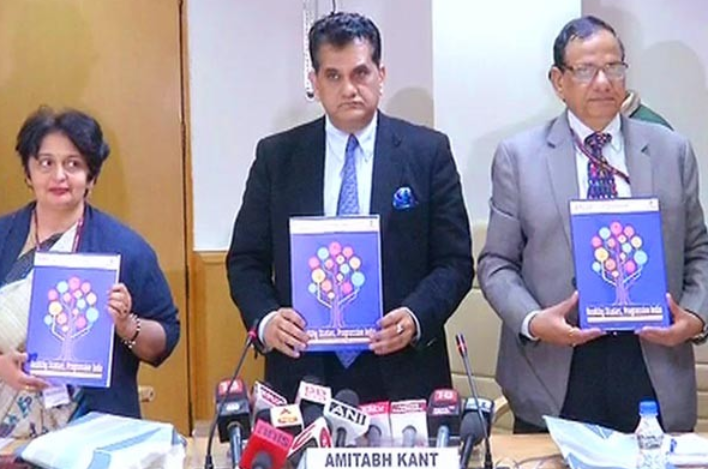
New Delhi: Kerala, Punjab and Tamil Nadu have been ranked on top in overall health index while Jharkhand, Jammu and Kashmir, and Uttar Pradesh saw maximum annual incremental performance among larger states, according to a report released by NITI Aayog on Friday.
In its ‘Healthy States, Progressive India’ Report, the organisation said Jharkhand, Jammu and Kashmir, and Uttar Pradesh saw maximum annual incremental performance in indicators such as Neonatal Mortality Rate (NMR), Under-five Mortality Rate (U5MR), full immunization coverage, institutional deliveries, and People Living with HIV (PLHIV) on Anti-Retroviral Therapy (ART).
“Our job was first to challenge states, secondly to do workshops with states and thirdly to put it in ranking. While historical ranking is important, it is very important for us to capture change per year. Best thing was that the eastern states Jharkhand and Chhattisgarh have done very well. They have come fourth and fifth and have moved up the ladder very fast, banking on radical reforms,” NITI Aayog CEO Amitabh Kant said while releasing the report here.
Among smaller states, Mizoram ranked first, followed by Manipur on overall performance, while Manipur, followed by Goa, were the top ranked states in terms of annual incremental performance, due to progress on indicators such as PLHIV on ART, first trimester antenatal care (ANC) registration, grading quality parameters of Community Health Centres (CHCs), average occupancy of key State-level officers and good reporting on the Integrated Disease Surveillance Programme (IDSP).
Among union territories, Lakshadweep showed both the best overall performance as well as the highest annual incremental performance, with improvement in institutional deliveries, tuberculosis (TB) treatment success rate, and transfer of National Health Mission (NHM) funds from State Treasury to implementation agency.
The Health Index report noted that while States and UTs that start at lower levels of development are generally at an advantage in notching up incremental progress over states with high Health Index scores, it is a challenge for States with high Index scores to even maintain their performance levels.
For example, Kerala ranks on top in terms of overall performance but sees the least incremental change as it had already achieved a low level of Neonatal Mortality Rate (NMR) and Under-five Mortality Rate (U5MR) and replacement level fertility, leaving limited space for any further improvements.
However, the incremental measurement reveals that about one-third of the States have registered a decline in their performance in 2016 as compared to 2015, stressing the need to pursue domain-specific, targeted interventions. Common challenges for most States and UTs include the need to focus on addressing vacancies in key staff, establishment of functional district Cardiac Care Units (CCUs), quality accreditation of public health facilities and institutionalisation of Human Resources Management Information System (HRMIS).
Additionally, almost all larger states need to focus on improving the Sex Ratio at Birth (SRB), the report said.
“The Health Index as a tool to leverage co-operative and competitive federalism to accelerate the pace of achieving health outcomes. It would also serve as an instrument for nudging states, union territories, and central ministries to a much greater focus on output and outcome based measurement of annual performance than is currently the practice,” the NITI Aayog report said.
The report also noted that rich learnings have emerged in the first year and these will guide in refining the index for the coming year and also address some of the limitations. It further emphasized on the need to improve data systems in the health sector, in terms of terms of representativeness of the priority areas, periodic availability for all states and union territories, and completeness for private sector service delivery.
This Index, the NITI Aayog said, is expected to nudge states towards further achieving a rapid transformation of their health systems and population health outcomes.









